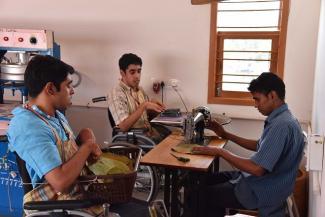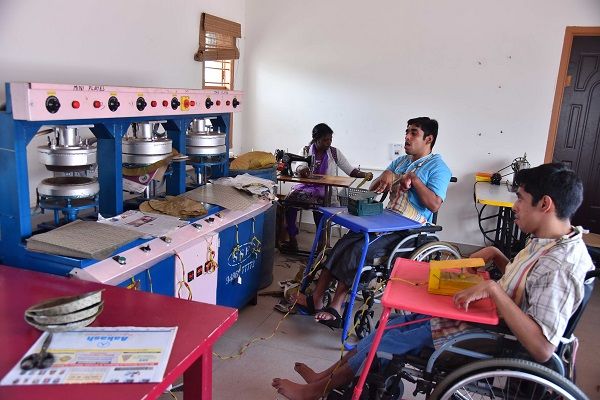
Sunder and Sriram are twins who were diagnosed with cerebral palsy when they were just 6 months old and who now run Twin Twigs, an eco-friendly business initiative. Ramesh and Radha are their enterprising and supportive parents. The twins and their parents talk to PatientsEngage about this exciting endeavor with the dual goal of creating employment for disabled persons like themselves and making our world plastic-free via a sustainable green model.
Sriram and Sunder respond to questions by PE:
1. Tell us a little about your new business?
We are the budding entrepreneurs who started Twin Enterprises. We make eco-friendly party ware under the brand name “Twin Twigs”. Our party ware products include cups, saucers and plates, which are all made of Bahunia leaves. Bahunia leaves need no artificial coating and they have a natural adhesive which binds the leaves together, so that no artificial glue is required. Unlike areca nut plates which often carry fungus and can infect the food that is being served in it; our products are completely safe and hygienic to eat from. Above all, our products decompose right away once discarded and leave no ecological foot print behind.
2. How did you come up with the name “Twin twigs’?
The name is derived from the fact that we are twins and the word twig has several meanings including:
- Young shoot representing the current season’s growth of a woody plant.
- To find out or suddenly comprehend something.
We are two young twigs on our path of discovering and understanding on how to make this earth a better place.
3. What do you like most about your work?
Sunder: I like everything about it especially the manufacturing part and meeting people.
4. What are your future plans?
We wish to expand the unit and grow the business.
Ramesh (the father) shares more of the background
1. What was the inspiration or thought behind it? Did you face any challenges?
After the twins graduated from school at age 18, they had nothing to do. I was looking at ways of making them productive and engaged. They were both interested in my Construction Company at the time, but I soon realized that working at the construction site was not feasible for them. Sunder voiced his desire to become a receptionist, so we looked into that but no one was willing to hire him with his physical disability. We then started to brainstorm on various employment opportunities but those were far and few in between. My sons have always been keen about Mother Nature; they love gardening and so the concept stemmed from there on. We thought why not make something out of leaves which are easy to make and sell. In 2010, when the twins were about 20 years old, we started Twin Enterprises. Their friend Karthik, who is like a son to us also joined in.
2. How did it all start?
We commenced with 3 manual machines and a workplace in the ground floor of our 4 story house. My initial goal was to inculcate a work culture for them, such as getting ready every morning, and going to work on time everyday etc. They work from 9:30am to 6:30pm daily. We started with 2 tailors and one assistant at the time. I sourced inventory for them and then would analyze their production. In three months’ time, they had tripled their sales. It was now time to market the product, so I set out with Sunder to all the nearby offices and displayed our products during lunch service.

3. What adaptations did you have to make for your sons at home and at work?
My entire home is now customized to accommodate their needs. I have fitted railings and made bathrooms wheelchair friendly. The flooring has been changed from smooth tiles to rough flooring to avoid slippage and provide traction. A lift has been installed in my 4 story house which can fit 10 passengers. For the workplace, all the machines are modified as per their requirements, so they can independently operate them. Even the scissors are custom made.
4. What role do you all play at work (job responsibilities)?
Sriram is in charge of supervision and production. He is a real task-master and gets the job done. His meticulousness is an asset because he is disciplined, strict with his work ethics and delivers on time.
Sunder loves meeting with people and so naturally took on marketing and delivery. He is also our planner and helps with designing of logos, website etc. He is calm, polished and good at delegating. He helps his brother with production as and when required.
Karthik is the organizer and does the weekly planning. He also steps in to look out and care for his friends when needed.
I oversee the entire business and manage their finances. My wife Radha, who is a special educator, makes a notable contribution by keep everyone’s morale’s up and keeping us all in line.
5. How has it helped them? What changes have you noticed?
The most significant change in their lifestyle has been the increase in social interaction with their friends, employees, customers etc. They make many social plans themselves now and go out to restaurants, malls etc. Their self-esteem soared after they got their first debit card and when I taught them how to use it at an ATM. They go shopping on their own now and purchase their own clothes.
6. How did you overcome any challenges?
I never get emotional about work. Challenges are present in every aspect of life, so escaping them is never an option. I believe in being tenacious and facing them head on. Any crutches that life gives us should be employed as opportunities. For my children, I made sure that the tempo was always high, so they stayed motivated. It was important for them to build trust. I don’t set very high targets that may be unachievable and disappointing. Instead, I give them targets that 5-10% higher than what they are capable of. Even with our products, we do not want people to buy out of sympathy. We want the focus to be on the quality of the product and ask our customers to reject it if they are not happy. We did not want obligations and so our marketing does not emphasize on the disability factor. I would like the society to look beyond pity and encourage our children to do more and better. Awareness is key for progress and growth of our society.
7. What are your future plans? Where do you see Twin Enterprises in 5 years?
I want the business to touch 10 lakhs (1 million) per month. We have already grown multifold since our inception in 2010. We now supply our products all over India and have opened an office in my hometown of Bhopal. Like every new undertaking, advancement will take time. By 2020, my sons will be 30 years old and would have gained good experience of running the business for 10 years. Their desire is to increase the product range with additional eco-friendly goods such as bags etc.
Expanding will moreover provide employment to more marginalized people. We currently employ about 15 people (both disabled and able-bodied). Sunder and Sriram have always been interested in horticulture, so a nursery may be in the cards.
8. How do you think this will help your twins in the long run?
I want my sons to be independent, thoughtful and productive. I want to give them the skills to make their venture economically viable. I want to dissolve the term “dis” from disable, because they are able as anyone else.
9. What is your advice to other parents who have children with disabilities?
I know that maintaining children who have physical and functional afflictions can be very costly. Wheelchairs, customized homes, transportation, home care etc. are all expenses that are unavoidable. To reduce this financial load, it is imperative that once the children turn adults, they should be provided with a vocation that can help their lifestyles and set a future for them. Encourage them to be entrepreneurs and make use of government sanctioned loans such as the Mudra yojana.
While the children are young, parents should be proactive with choosing the right school and participating in their education. This can significantly aid in recognizing your child’s aptitudes early on. Once you have identified their strengths, develop them and teach them practical life skills. Parents need to remember that there are no schools for disabled adults so plan for their future.
If you know of other such entrepreneurs write to us at editor@patientsengage.com






